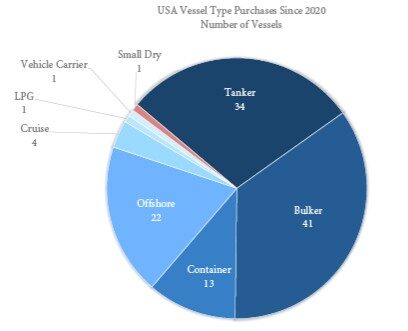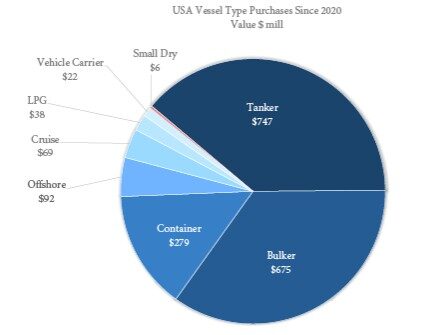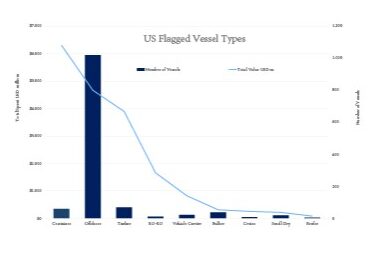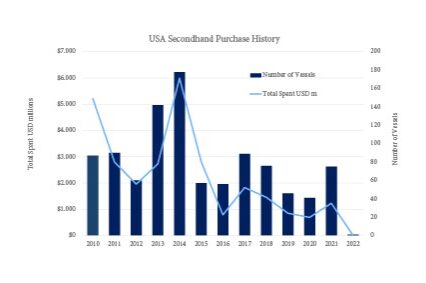The American government aims to have more ships in the national merchant fleet. Support has now come from the Northeast Maritime Institute – Center for Ocean Policy and Economics, which has presented an action plan with many proposals.[ds_preview]
A look at the current fleet shows that there are indeed expansion, modernisation and financing activities. But there is still room for improvement. We present some highlights:
The »Revitalization Plan for U.S. Maritime Trade, Commerce, and Strategic Competition,« developed by the Northeast Maritime Institute – Center for Ocean Policy and Economics, provides short, medium, and long-term solutions. Building upon the Merchant Marine Act of 1920, »The Jones Act,« the Plan aims to provide a framework for a »coherent and comprehensive national maritime strategy« that protects both domestic capacity and enhances international operations.
There is an urgent need for a strategic shift in U.S. maritime practices, both to overcome current dysfunction and to create strategic capacity and economic vitality that will last into the next century, the authors say: »In an increasingly volatile world – with aggressive competitors with different values – it is critical for the U.S. to develop maritime capacity that upholds a rules-based international order and promotes transparent global maritime trade and commerce. Increased U.S. participation will strengthen America’s soft power relationships and competitive influence, all while providing enormous benefits and opportunities to the U.S. economy.«
U.S. commercial vessels constitute just 0.4% of the total global fleet. In the past five years, the U.S. commercial fleet declined by 12%, while the People’s Republic of China’s increased by 55 %.
Less than 2% of U.S. imports are carried on U.S.-owned ships, and less than 1% of U.S. imports are carried on U.S. flagged ships. U.S. maritime operators and government agencies have little control over vessels registered under opaquely operated foreign flags, which facilitate criminal activity. Also, the Department of Defense is heavily reliant on foreign-flagged tankers. »This dramatically increases national security risks, especially during prolonged conflicts,« it is said.
The Jones Act serves to protect U.S. coastal trade but is described as hindering overseas influence and strategic competitiveness. U.S. laws disincentivize U.S. ownership of vessels and the registering of vessels under the U.S. flag. Traditionally, the U.S. have supported the top three open international flag state regimes. Now, the wind has changed: »They have since grown too large for true compliance oversight and lack the desire to provide genuine global law enforcement services.«
A new secondary U.S. Flag dedicated to international trade and commerce is proposed. It should provide »a significant increase to U.S. tonnage […] and incentivize U.S. financing, investment, and ownership in domestic maritime initiatives.« Northeast Maritime Institute developed and currently manages and operates the Dominica International Ship Registry. For the last 21 years, the Dominica Flag »has proven to be a great asset for the disruption of illicit activities«. While there has been some success, there have been serious limitations on how far the Dominica Registry could go, it is criticized. One argument is the government of Dominica’s »inability to ratify relevant treaties, maintain transparent domestic support, and maintain the traditionally needed resources.«
New flag from Virgin Islands?
Besides the proposal to create a Maritime Venture Capital Fund, the analysts demand the launch of an open international U.S. flag in the U.S. Virgin Islands (USVI) to provide responsible and transparent oversight to a commercial fleet of foreign and domestically owned and operated vessels. This would benefit from the full collaborative capacity of U.S. government partners as well as interagency cooperation. It could provide more flexibility and cost benefit in maintaining a multipurpose commercial international fleet – since USVI is exempt from the Jones Act.
»The U.S. Virgin Islands are an organized, unincorporated sovereign U.S. territory exempt from the Jones Act. USVI is the most strategic location in the United States from which to stage a core aspect of this plan,« the institute says.
It remains to be seen, if and how the Biden administration will react to this proposal – and if and how the international shipping community can be convinced to invest in the U.S. fleet. (MM)























